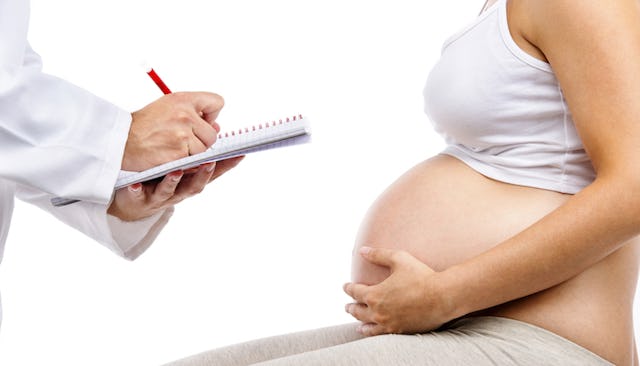Experts Are Finally Realizing Women Need To Be Screened For Depression During Pregnancy

New recommendations say all women should be screened for depression during and after pregnancy.
Awareness of postpartum depression is at an all-time high, thanks to things like blogs, social media, and celebrity moms who’ve spoken out about their personal struggles. Still, not enough women are getting they help they need, and that’s why some new recommendations by the U.S. Preventive Services Task Force say all women should be screened for depression not only after having a baby, but also during their pregnancies.
The recommendations were released today as a part of the panel’s official stance that all adults should be screened for depression. In both 2002 and 2009, the panel recommended screening new moms, but this is the first time they’ve expanded their advice to specifically include pregnant women. Dr. Michael Pignone, who helped author the recommendations, tells the New York Times evidence shows better outcomes for women who are diagnosed and treated during pregnancy, and that’s why they specifically called for screening during that period.
According to the panel, depression is the top cause of disease-related disability among adults, and nine percent of pregnant women and 10 percent of new moms will go through at least one major depressive episode. Even more worrisome, a BabyCenter survey of 1,400 moms found that 40 precent of women never get help for their postpartum depression. Rather, they — and their babies — suffer in silence.
The problem, of course, is that depression is hard to recognize if you’ve never dealt with it, and most of us assume it’s something that happens after the baby comes. Without talking to an doctor, it’s absurdly difficult for a pregnant woman to know that what she’s going through emotionally isn’t “normal.” Even more difficult is finding the courage to talk about what’s going on when there’s still so much stigma surrounding depression, and the dominant cultural narrative seems to be that pregnancy and new motherhood are the most joyful time in a woman’s life. Pregnant women need their doctors to ask tough questions and dig a little deeper.
I had untreated depression and anxiety throughout my first pregnancy and for seven months of my daughter’s life. It wasn’t that I failed to read about depression in What To Expect When You’re Expecting, or that my doctor didn’t tell me over and over again to call him if I “felt sad.” Rather, I had no idea that my level of emotional instability counted as depression. I chalked my listlessness and crippling anxiety up to stress and hormones, and told myself it was totally normal. Once I got help, I realized how long I’d truly been suffering, and I understood that my illness started long before I ever gave birth.
Screening for depression during pregnancy would prevent so many women from waiting to seek help and from losing those early months with their baby to feelings of anxiety, despair, and hopelessness. It could also help educate women about what is and isn’t normal, and keep them from waiting to talk to their doctors. These recommendations may not seem like a big deal to some, but for women like me who know all too well what it’s like to live with untreated and undiagnosed depression, they’re an inspiring change. Hopefully doctors take note and screening for depression both during and after pregnancy becomes the universal norm.
This article was originally published on